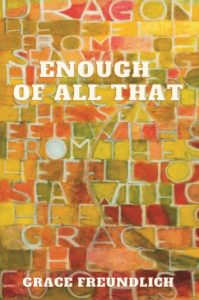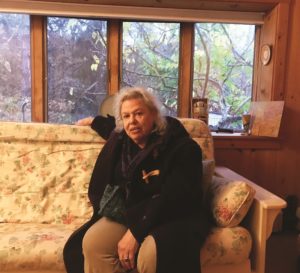Grace Freundlich is a survivor in our midst. Retired and now 80, she lives in Truro year-round and counts it as a blessing.
She has written a memoir of her life, Enough of All That, which was recently published and is available on Amazon, and she contacted the Independent about reviewing it. Reading the book was revelatory. It’s a powerful stream of consciousness, and it will work its way into your dreams.

Grace’s parents were German Jewish refugees from Nazi terror. They came here before World War II, and Grace was born in the U.S., in New York City. Though she didn’t experience the nightmare of the Third Reich directly, it has been omnipresent in her life, to devastating effect.
Grace, who deeply regrets decisions she has made — marrying the wrong man, trusting people who scammed her — and who has been dogged by the cruelty and ill will of her family, has been through years of therapy. But she recently started seeing a therapist who recognized much of her misery as symptoms of post-traumatic stress disorder (PTSD). The source of that trauma, the therapist told her, was transgenerational: it could be traced to the Holocaust.
The idea of PTSD crossing a generation, removed from the original spark of terror, is not widely understood, but it’s gaining a following among psychologists. It’s a phenomenon that I recognized immediately.
I, too, am a child of the Holocaust, my mother a refugee of Nazi Austria, and her father, my grandfather, a survivor of Auschwitz. I know how it traumatized her, and how, in turn, it has affected me. In my New Jersey home town, there were many concentration camp survivors. Their children, some of whom were my friends, were indelibly scarred by their parents’ histories. A buddy of mine had a breakdown as a young adult that was clearly a result of his parents’ stunted development. I’m sure this is true of any number of children of genocide and slavery — refugees of all kinds. And I understood exactly what Grace Freundlich was writing about.
Grace’s burden has been lightened by the PTSD diagnosis. She is now less inclined to blame herself for “sabotaging” her own life.

Enough of All That is not a conventionally structured memoir. It reads much like a prose poem, and, in fact, poems are interspersed throughout. There are dreams and vignettes, memories and portraits of people Grace is indebted to for their kindness and friendship, some from her earlier years and many from her time in Truro.
It’s not a horror story. Grace tells the Independent that she can’t bear to relive the worst things that have happened to her. Reading the book is a bit like a therapy session, with Grace as the elusive patient. But gradually, a sense of what her life has been like emerges.
She grew up in the Washington Heights neighborhood of Manhattan in a loveless household, filled with lives emotionally deadened by the Holocaust. Her maternal grandmother, the only grandparent she knew, lived with them. When Grace was five, her brother was born.
“My grandmother hated me and doted on him,” Grace writes. “I was a girl, and Lord knows why else she hated me. Other than that, she never stopped yelling at me and never said a nice word or gesture nor did she ever touch me…. Hard to believe, but I was never allowed to touch my brother and always they said ‘Get away from that child.’ ”
Her mother was passive in the face of her grandmother’s misogyny and abuse, and when Grace was seven, her father died. Her mother went to work, and Grace was left in her grandmother’s hateful grip. This Cinderella-like existence continued until Grace left for college. She went to the University of Wisconsin in Madison and studied art.

All the warmth and tenderness she received came from people outside her home. She had no confidence and didn’t really understand romantic love. She married a man who left her with two young sons. As a single mother, she worked, teaching adults English as a second language. She also painted. An art fellowship in Provincetown drew her to the Cape, where she eventually bought a house and retired. The house in Truro “had a strange little attic to possibly climb into if (I do not kid here) the Nazis were after me. Anne Frank’s diary was my close identity piece.”
Relations with her family are troubled — her brother estranged, her sons and grandchildren often distant — but Grace writes appreciatively of the support she has found on the Outer Cape, and of an artist in England with whom she finally found love.
One of her most haunting memories is of the childhood innocence she never had. Grace encountered a young girl in Niantic, Conn., on her way to the Cape, inspiring a poem, “Here’s the Girl”: “She came to me from/ where she was walking./ Behind me her happy voice/ called out ‘Excuse me, Lady’/ Surprised by her voice/ I stopped and smiled when I/ saw her. ‘I have a boo-boo/ from today in school.’/ ‘That is dreadful’ said I and/ her mother laughed with that./ It was a moment/ to keep as a snapshot./ Her gay laugh amidst/ all the children who/ nevermore would be that, who/ really knew what was dreadful.”
Grace has learned to fight the dread. Enough of All That is a testament to her survival.



